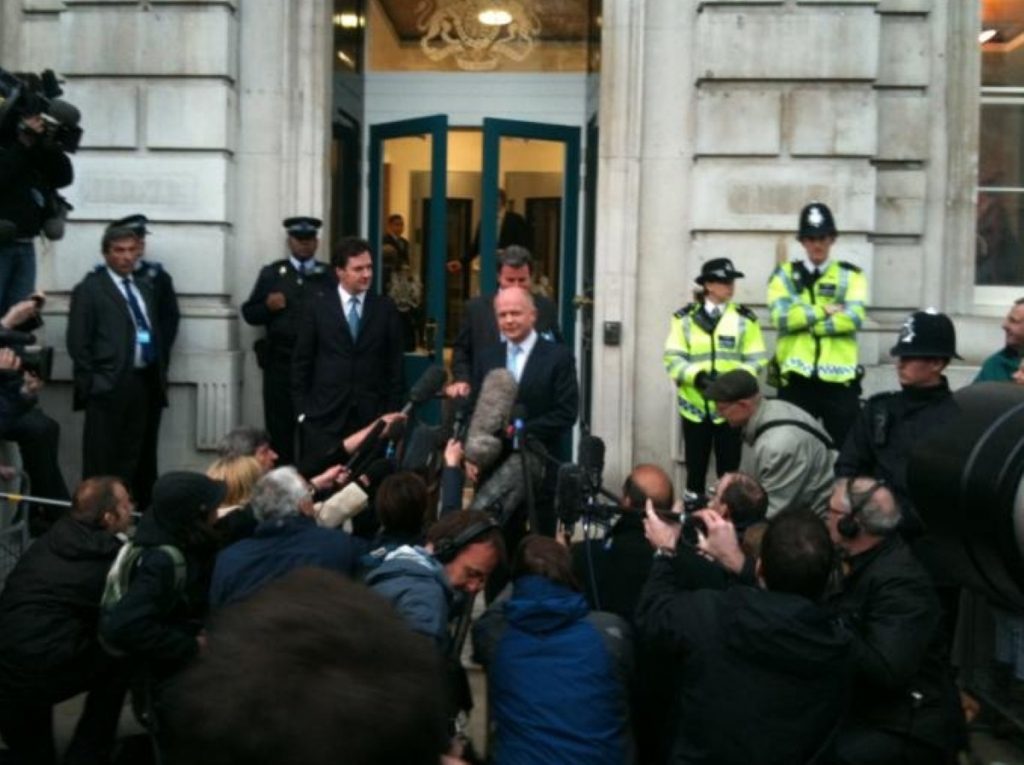MPs rubber-stamp Lib-Con coalition
By Ian Dunt and Alex Stevenson
Conservative and Liberal Democrat MPs have given their approval to the formal coalition agreement between their two parties finalised earlier today.
The agreement features a commitment to maintain the coalition for at least four years.
“The Liberal Democrat parliamentary party and the federal executive has today endorsed the agreement reached between the Liberal Democrats and Conservatives to form a coalition government, by the required three quarters majority,” a Lib Dem spokesperson said.
Details of the plan seem to show a very Tory-friendly deal, with the Lib Dems agreeing to a replacement of Trident, a cap on immigration and cuts of £6 billion to non-frontline services in 2010/11.
The party also agreed to not join the euro for the duration of the parliament.
The planned rise in national insurance will not go ahead, as per both parties’ election promises.
A Downing Street spokesman today confirmed that Mr Clegg would become deputy prime minister, and that four other Cabinet positions would go the party, but it is unclear if that will be sufficient to mollify Lib Dem MPs and party members concerned at the policies the party has now signed up to.
Speculation about Cabinet posts is now rife. David Laws is expected to become children’s secretary for the Lib Dems, but Vince Cable will miss out in No 11. He is set to become chief secretary to the Treasury with George Osborne as chancellor.
Much rests on whether the Home Office brief goes to Lib Dem Chris Huhne. Such an important post might be enough to calm Lib Dem jitters, but there is no confirmation it has been agreed.
Analysis: Lib-Con pact reshapes British politics
Lib Dems: Labour scuppered progressive alliance
The details of a comprehensive coalition agreement were finalised during a five-and-a-half hour meeting between the Lib Dems and the Tories which was completed shortly after 19:00 BST at the Cabinet Office.
Comment: Lib-Con pact is a wasted opportunity
Immense crowds gathered outside the Cabinet Office this afternoon, where Lib Dem-Tory talks were taking place. Protestors, journalists, and curious tourists mingling together in huge numbers as everyone waited desperately for the two teams to emerge.
The talks took place after the complete breakdown of Lib Dem-Labour talks earlier in the day.
Several Labour MPs had earlier expressed concern about an alliance with Britain’s third party.
Schools minister Diana Johnson became the first Cabinet-level figure to say she thought a Lib-Lab coalition would be too unstable.
A little later health secretary Andy Burnham became by far the most important Labour figure to speak out against a deal.
“I think we have got to respect the results of the general election and we can’t get away from the fact that Labour didn’t win,” he was quoted as saying.
There were positive noises from the Tory backbenches though, with Douglas Carswell telling politics.co.uk: “I think the days of mass brand generic politics are breaking down. There’s an appetite for the niche and the distinctive.
“I think it’s in our interests to form a political interest that allows that.”
Today’s negotiations provided another frantic and confused day in Westminster, following a tumultuous series of events yesterday.
Gordon Brown’s announcement that he would stand down as Labour leader implicitly mapped out the remaining aspects of the Labour offer to the Lib Dems: a new Labour leader, legislation for the alternative vote (AV), and a subsequent referendum on a more proportional system.
The Conservatives offered the Lib Dems a referendum on AV – a remarkable development given the party’s historic opposition to such a move.
A Lib-Con pact will be more stable, having enough parliamentary seats to secure a Commons majority.
A Lib-Lab pact would have required other coalition partners or an agreement that they would back central piece of legislation in the Commons while the Lib-Lab coalition forms a minority government.
But the real stumbling block to a Lib-Lab deal appears to have been Labour’s intransigence. A memorandum released this evening from the Lib Dems attacked Labour for never taking the prospect of a coalition seriously.





-01.png)